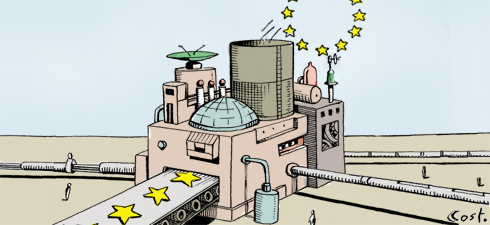A spectre is haunting Europe. The memory of the 2005 national referendums rejecting the EU constitution has led political leaders to respond to the current crisis with emergency measures that don't require popular approval. But longer-term solutions demand democratic legitimation.
The commission president, José Manuel Barroso, has gone so far as to call for a federation of nation states. Germany's Guido Westerwelle, together with eight other foreign ministers, recently proposed fundamental reformsthat might lead to a two-speed Europe – so long as a qualified majority of member states approved, their new treaty would bind them even if the other states do not go along. Such sweeping revisions can't be achieved without popular consent.
Direct democracy is a risky business. Europe should not repeat the organisational mistakes that contributed to the debacle of 2005. The constitutional convention then produced a 350-page text written in legalistic language that mystified ordinary voters. Worse still, nothing special was done to encourage citizens to deliberate seriously on the fateful choice before them. Little wonder that national debates were largely dominated by the petty politics of the moment.
This time around, Europe should follow the example of South Africa's successful three-stage experiment in constitutional creation. During the first stage, participants simply tried to hammer out a statement of basic principles. Only later did they follow through with a long legalistic text elaborating the new social contract. Finally, it was up to South Africa's constitutional court to confirm that the long-form legalisms conformed to the initial principles.
To put this sequence in European terms, the project should follow current treaties by organising a convention representing national and European parliaments, heads of state and governments, and the European commission. This body would focus on formulating readily comprehensible constitutional principles – which could then be revised by an intergovernmental conference.
Was this article useful? If so we are delighted!
It is freely available because we believe that the right to free and independent information is essential for democracy. But this right is not guaranteed forever, and independence comes at a cost. We need your support in order to continue publishing independent, multilingual news for all Europeans.
Discover our subscription offers and their exclusive benefits and become a member of our community now!












